Dealing with a loss of appetite in older adults
Tags
Care at Home for the Elderly: A Guide for Caregivers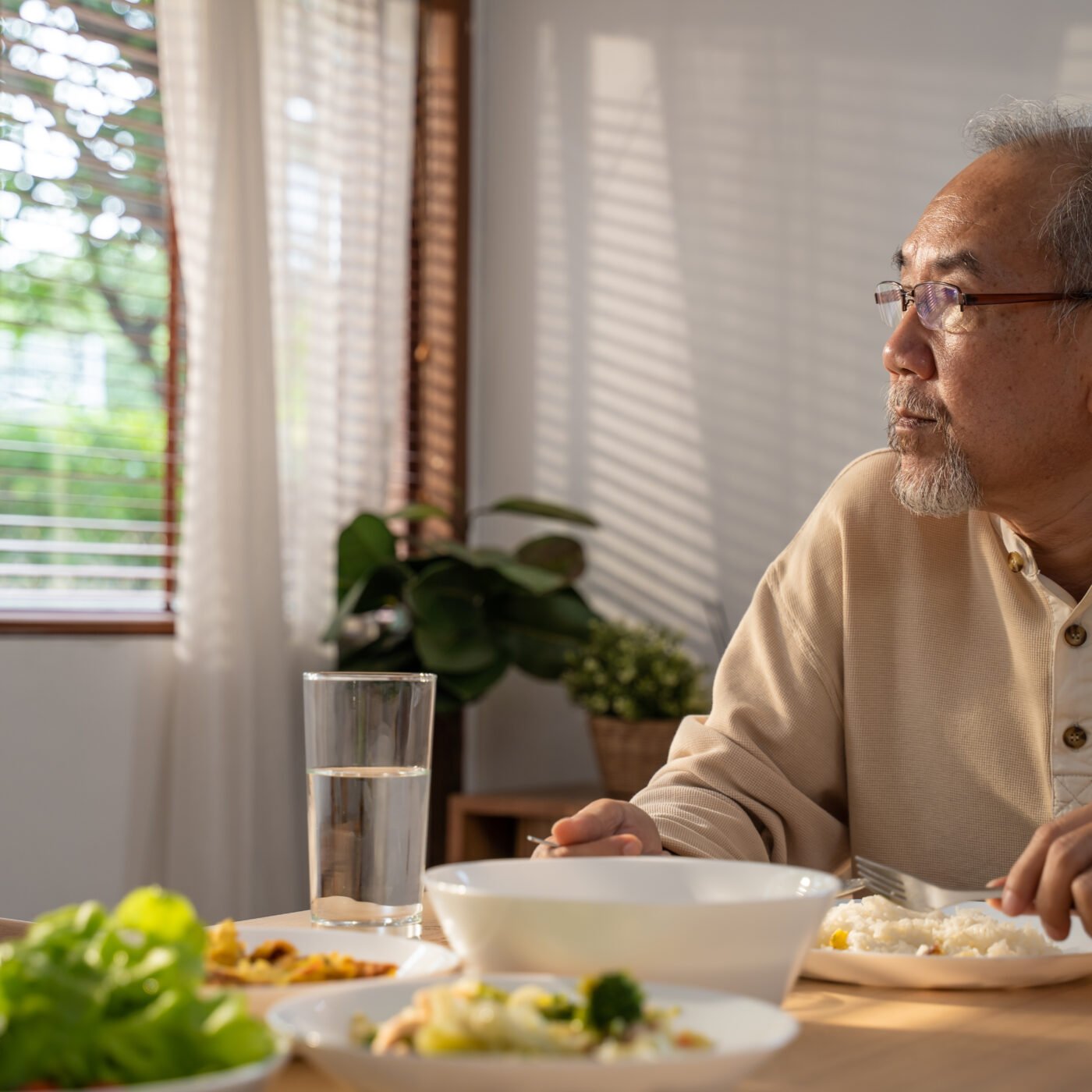
Several factors, such as physical and mental conditions, medications, and vitamin or mineral deficiencies, can influence appetite. However, making small changes, such as adjusting your diet and mealtimes, may have a significant impact.
If you or a loved one experience difficulties with eating and experiencing unintentional weight loss, it’s advisable to consult a health professional who can guide you on improving appetite and weight gain.
Poor appetite is common in older people living at home and in care homes. It can cause weight loss, nutritional deficiencies, and poor healthcare outcomes. Understanding the causes of reduced appetite and knowing when someone needs to eat more can help you find ways to promote a better appetite and ultimately improve eating routines.
What can cause an older adult to lose their appetite?
Various factors, such as changes in social circumstances, illness, chronic disease, and physiological function, can contribute to losing appetite as we age.
Physical and biological reasons
As we age, our bodies undergo physiological changes that can impact appetite, including changes to the digestive system, thyroid disorders, hormones, and our senses of smell, taste buds, and vision. Additionally, there’s an increased likelihood of experiencing several different health issues at the same time. All of these things can cause a smaller appetite.
For example, around one-third of individuals over 65 may experience reduced saliva production, causing a dry mouth, which can lead to difficulties with eating. While this is not considered a typical aspect of natural ageing, it can be due to medication side effects, wearing dentures, or maintaining poor oral health.
Older individuals may experience slower gastric emptying (meaning food sits in the stomach for longer) This prolonged food retention can lead to a decreased appetite as people feel fuller for longer. Additionally, conditions like constipation are more prevalent among the older generations and can contribute to this issue.
As people age, impairments in taste, smell, and vision can also diminish the enjoyment of food. a person may suddenly go off foods they used to love and struggle to find a satisfying replacement.
Environment and social reasons
Depression, anxiety, and loneliness are prevalent among older adults and can significantly decrease appetite. Eating alone is generally less enjoyable, and older individuals who live alone, particularly those who to struggle with shopping and cooking independently, may be less motivated to eat. Changes in living arrangements, such as moving into a care home or financial changes after retirement, are additional factors that can impact the appetite of older individuals.
When caring for an older loved one who has no appetite, it’s essential to first rule out any health conditions or medications that may be causing this. If a medical reason can’t be found there are things you can try that may encourage them to eat.
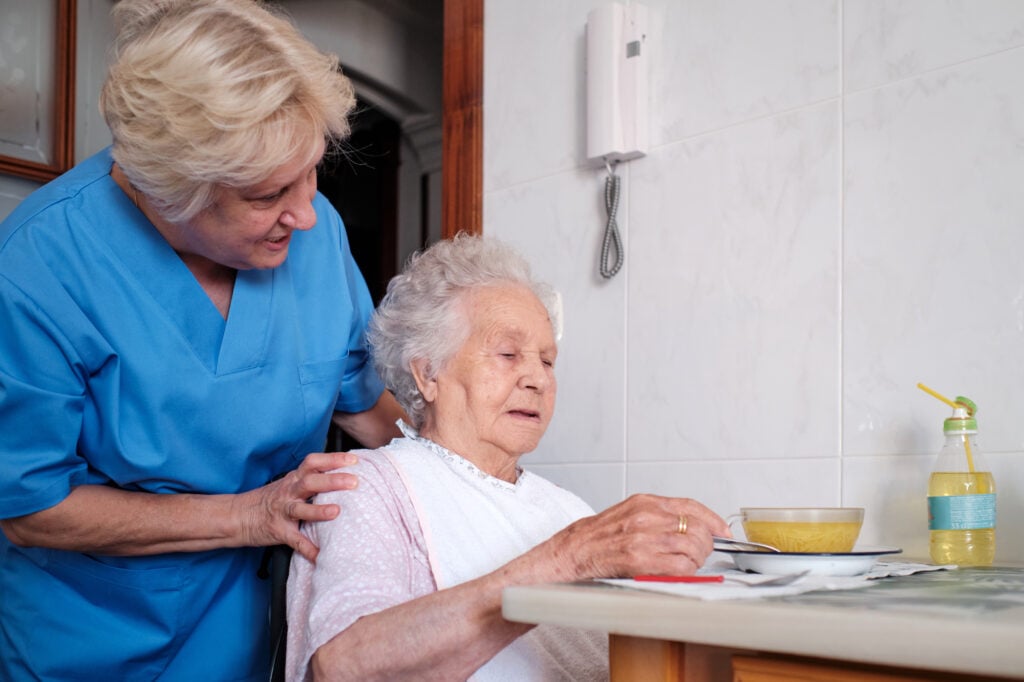
What can help stimulate an older person’s appetite?
Keep to a regular daily routine
A consistent routine for meals and snacks can help restore an older person’s appetite. It’s advised to serve meals and snacks at regular intervals each day.
Combine smaller portions with high nutritional content
An overwhelming amount of food can be unappealing for individuals with a diminished appetite. When caring for an older person in this situation, providing smaller portions, such as four or five smaller meals throughout the day, may be beneficial rather than three large ones.
Depending on individual dietary requirements, you’ll likely want to include nutrient-dense foods like fruits, vegetables, eggs, seeds and healthy fats such as avocado, nut butters, and olive oil in these smaller portions.
Finger Foods
Health conditions such as arthritis, Parkinson’s, and dementia can cause difficulties in using utensils, so while a person may not have a lack of appetite, they may struggle to eat the foods they want. One possible solution is to offer finger foods, such as fish or chicken strips, and sticks of raw or steamed vegetables like carrots, cucumber, and peppers.
Soups And Smoothies
Soft and liquid foods can provide a suitable alternative for an elderly person with difficulty chewing. Nutritious soups can be easily prepared by pureeing meats and vegetables, and their nutritional value can be increased by incorporating cream or olive oil. Smoothies, made with fruits, vegetables, or a combination of both and full-fat yoghurt, are also a simple and healthy option for increasing calorie intake.
More tips for eating with a small appetite
Increasing calorie intake in a meal to stay nourished and energised
Calorie is another word to describe the energy we get from our food. Fats and sugars are high in calories. Without enough calorie intake, there’s a risk of malnutrition. An additional method to guarantee sufficient daily calorie intake is by increasing the calorie content of single meals.
If you or your loved one’s appetite is small, when you can eat a meal, you can increase the calorie content of it by incorporating ingredients high in calories, such as butter, nut butters, olive oil, or whole milk. For example, when cooking eggs, add one tablespoon of butter – which can increase the calorie amount by around 100 calories. If eating salad, add a tablespoon of olive oil or half an avocado – this can add at least another 100 calories to a salad.
Make mealtime an enjoyable social activity
Research conducted in 2022 suggests that there may be a correlation between eating alone and a decreased appetite, indicating that cooking and eating a meal with others might have a more significant impact on stimulating appetite.
To enhance the dining experience, consider inviting others for meals or trying social events while eating to divert attention from the food. These approaches assist in shifting focus away from the meal.
Studies indicate that individuals who frequently eat alone may experience lower diet quality and inadequate nutrient intake. Creating a social and entertaining atmosphere during meals may enhance the enjoyment of food and potentially increase appetite.
Incorporate healthy snacks
Eating larger meals may seem overwhelming, while smaller, easily consumed snacks can be more convenient and require less effort to increase your food intake. Snacks can be helpful for people on the move or who engage in physical activity to maintain adequate nutrition.
Snacks shouldn’t be used as a substitute for nutritious meals but as a complement towards proper nutrition. Therefore, avoiding snacks close to mealtime is advisable as it may impact your appetite.
Examples of healthy snacks:
- Salty snacks like popcorn or trail mix
- Protein bars or granola bars
- Fruits like bananas, apples, and oranges
- Greek yogurt or cottage cheese and fruit
- Nut butter and crackers
Eat favourite food more often
Easy – eat favourite food to improve your appetite. Your favourite meals are the best appetite stimulants. In quite an obvious way, you’re more likely to eat your favourite meal than the ones you don’t find appealing. Research indicates that individuals consume more food and do so more frequently when allowed to select their meals.
To increase your consumption of your favourite food, it’s important to allocate time for planning and preparation so you always have them on hand.
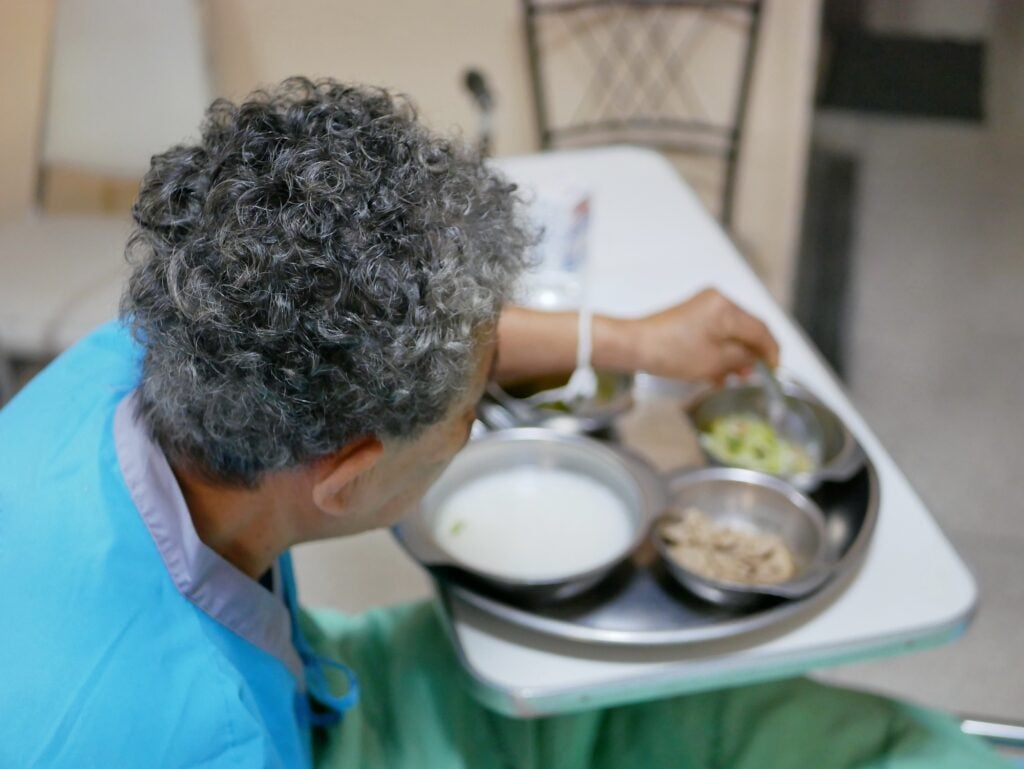
Dysphagia
The above solutions are unsuitable for individuals who have difficulties with swallowing (dysphagia), a severe condition that can result in nutritional deficiencies and dehydration. Dysphagia can affect people of all ages, but it’s more common in older people. It can be caused by various factors such as dental issues, weakened mouth and throat muscles due to ageing, acid reflux, stroke, mouth, throat, or oesophagus cancer, Alzheimer’s, and dementia. If your loved one is displaying symptoms of dysphagia, such as choking on food, liquids, or medication, drooling, coughing while eating or drinking, or experiencing difficulty swallowing, it’s essential to talk to their GP.
When encouraging an older person to eat, it’s essential to keep track of their food preferences, dislikes, and any difficulties they may have with eating or digestion after ruling out any underlying medical conditions.
Monitoring the times of day when they are more inclined to eat is beneficial. By conducting experiments and demonstrating patience and creativity, you can assist your loved one in finding enjoyment in food and maintaining good health.
When to see a doctor for loss of appetite?
If poor appetite is unusual and sudden, causing rapid weight loss accompanied by symptoms such as prolonged fatigue, loss of smell or taste, nausea, vomiting, or digestive problems like abdominal pain, diarrhoea or constipation, it may suggest an illness that requires medical attention. If in doubt, always seek medical advice.
Read more care guides

A guide to speaking with a loved one about home care
Why do older adults resist care? A guide to speaking with a loved one about home care Bringing up the topic of care at home

How to choose the right personal alarm for seniors: A comprehensive guide
Personal alarms for elderly Discover how personal alarms work, who they’re best suited to, and how they provide greater peace of mind to older people

Bath aids for elderly – finding the right solution for your needs
Bath aids for elderly Getting in and out of a bath tub or moving around the bathroom safely can become difficult as we get
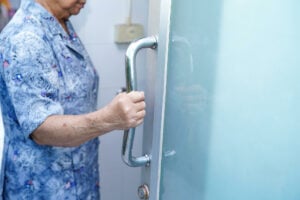
Helping with personal care and elderly incontinence
Helping with personal care and elderly incontinence Incontinence is something which many elderly people experience, and yet it is a subject which is rarely discussed.
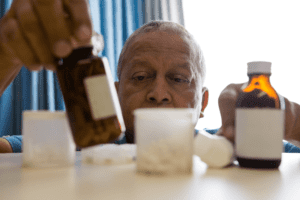
Controlled drugs – what are they?
What is meant by controlled drugs? Controlled drugs (CDs) are defined in the The Misuse of Drugs Act 1971 as drugs which are ‘dangerous or

Using a dosette box & medication management
What Is The Best Way To Use A Dosette Box? For older people who take various prescribed medicines, a dosette box can be an